
Chanukah, the Festival of Lights begins this Sunday night. Several of the members of Joshua's Army have requested some background on the story of Chanukah. Here goes...
Chanukah celebrates one of the important miracles in Jewish history and reminds us of the triumph of faith. It takes place every year in mid to late December. While its date varies if you go by the western calendar, in the Hebrew calendar Chanukah always falls on the 25th day of Kislev.
Chanukah celebrates the Jewish war for independence in the second century B.C. E. The story is told in the First Book of Maccabees, and retold in the Second Book of Maccabees. A contemporary military history of the war can be found in Battles of the Bible, coauthored by Chaim Herzog and Mordechai Gichon.
After his death, Alexander the Great's empire broke into several parts, and Israel was under the control of the Seleucid empire, based in Syria. Israel had lived peacefully under the Persian Empire and under the Ptolemic empire (of Egypt), both which tolerated Judaism; but the Seleucid Emperor Antiochus Epiphanes was an arrogant, bigoted Hellenizer, who attempted to force the Jews to abandon their religion and to adopt Greek customs and worship.
There were those Jews who considered themselves `modern' and `assimilated' who were willing to go along with this, even to the extent of having surgical operations to reverse circumcision.
Others did not, and they were prosecuted vigorously and brutalized by the Greeks.
The start of the Maccabean Revolt sprang from a single spontaneous act of resistance. In the foothills village of Modiin in 167BCE, a Greek army unit set up an altar, and ordered the local Jewish rabbi, Mattathias, to sacrifice a pig and eat it. He refused, as did his five sons. When a Jewish collaborator came forward to offer the sacrifice, a furious Mattathias "ran and killed him on the spot, killed the king's officer who was forcing them to sacrifice, and tore down the altar" (1 Mac. 2:15-25).
Mattathias, his sons and their followers then headed for the Judean hills, to launch a guerilla war. They were farmers who had no military training, fighting a professional army. There had not been a Jewish army since Babylon had destroyed the Judean kingdom four centuries before. Their only weapons were farming tools and whatever simple weapons they could construct, such as maces, bows and arrows and slings. During this first year, Mattathias died, and his middle son Judah took over command as his successor.
Nicknamed "the hammer" ("Maccabee," in Hebrew), Judah constructed a guerilla army that staged daring nighttime raids on the Greek outposts, then melted back into the countryside. His successes attracted more supporters, and the revolt spread. The war went on for 25 years, one of the most singular wars for independence in history. The miracle, perhaps is that it was fought at all, let alone won.
The Seleucids and Antiochus sent huge, well equipped armies into Israel to subdue the Jews. They were all defeated, at odds that seem miraculous even today. Judah Maccabee turned out to be a tactical genius, using unheard of tactics, leading the Greek phalanxes into the hills where they could not maneuver and destroying them.
In 164 BCE, the Jews defeated a force comanded by the Viceroy Lysias that outnumbered them two to one. That battle took place six miles north of Hebron, near the Jewish fortress of Beth-zur. The victory allowed Judah and his army to retake Jerusalem.
When they entered Jerusalem, Judah and his followers entered the Holy Temple on the Temple Mount. The Temple had been wrecked and horribly desecrated, with profanities scrawled on the walls and the Ark by the Seleucids.
The Maccabees built a new altar. When the time came to light the N'er Tamid, the Eternal Light of the Temple, the Jews could find only one sanctified jar of oil marked with the seal of the High Priest. It was only enough to last one evening. On the 25th of Kislev, in the year 164 BCE,the lamp was lit with this small jar of oil and, miraculously, stayed lit for eight days, until more oil suitable for the temple was made. The eight days of Hanukkah celebrate that miracle, as well as the divine intervention that had led the Jews to amazing victories over well-equipped professional armies far superior in numbers. "Therefore, carrying ivy-wreathed wants and beautiful branches and also fronds of palm, they offered hymns of thanksgiving to him who had given success to the purifying of his own holy place" (2 Mac. 10:7).
The war itself continued. In 160 BCE, near modern-day Ramallah, Judah was killed, but Judah's brother Jonathan, and then his brother Simon took command of the Jewish army, finally winning complete independence in 142 BCE. At last, "All the people sat under their own vines and fig trees, and there was none to make them afraid" (1 Mac. 14:12.).
Towards the end of the war, Antiochus and the Seleucids became so obsessed with defeating the Jews that they sacked their own cities and sold their own citizens into slavery to get money to pursue the war against the Jews.
The War of the Maccabees was the first war ever fought for religious freedom. Somehow, a group of farmers with no military training who refused to bow to their oppressors defeated a mighty empire and its immense standing armies. There seems to be no plausible explanation for the victory of the Jews except that it was a miracle.
Chanukah reminds us that with G-d's help, victory over evil is assured and no miracle is impossible. Modern Israel and the survival of the Jewish people against all odds are proof of that.
Symbols in Chanukah
Aside from the Hanukkiah (candlesticks), the other great symbol of Chanukah are those small spinning tops known as dreidels.
The four letters which appear on the four corners of a dreidel allude to the miracle of Chanukah. They spell out: Nes (N-miracle), Gadol (G-great), Haya (H-happened) and Sham (S-there, meaning in Israel). Or, `a great miracle happened there.'
Indeed it did.
Chag Sameach! Happy Chanukah!






3 comments:
The sanctified oil part of the Hanukah story is almost certainly a later addition, designed as part of a general desire to lessen the legendary status of the Heshmon dynasty (started by the "Maccabim").
Note that the real reason there are 8 days of Hanuka is that the holiday was intended as a delayed Sukkot (which also has 8 days). Sukkot was originally one of THE most important annual events of the Jewish calendar during which Jews from all over the Land of Israel would make pilgrimages to the Temple in Jerusalem in order to sacrifice lambs, etc., at the altar (no small journey, in a land that had no roads or even the wheel). After the liberation of Jerusalem and the re-sanctification of the Holy Temple, before which it had been impossible to celebrate Sukkot (which occurs about roughly 2-3 months before Hanuka), the Heshmonaim basically added a new holiday of Temple sacrifice to the Jewish calendar.
Remember, there is NOTHING bigger in the history of the Jewish people than actually creating a new religious holiday - not to mention one that was an ARCH-holiday, involving a pilgrimage to the Temple and sacrifices. This basically hadn't been done since the Temple was built. The ONLY holiday added to the Jewish calendar in the nearly 2000 years since our expulsion from the Land of Israel and the destruction of the Second Temple at the hands of the Romans (if we treat Tisha Be-Av as concurrent with the event) is Yom Ha'Atzma'ut (Israeli Independence Day) - and even that pales in comparison to the religious importance of resanctifying the Holy Temple itself.
It is an unfortunate irony that the Heshmonaim turned out to be a very nasty bunch of tyrant rulers themselves (just Judaean ones, instead of the treyfe, Hellenized, Seleucid tyrant Antiochus). After the fall of Heshmon dynasty, later generations uneasy with the almost Moses-like stature afforded to such a terrible bunch of rulers sought a way to gradually modify this enshrined holiday of national pride and reaffirmation of God's support, reducing the role of the Maccabim from the messianic to the heroic.
Centuries later, the oil version of the miracle of Hannuka was probably also far more accessible to generations of Diaspora Jews who no longer had any real collective memory of pre-rabbinical, Temple sacrifice-centered Judaism, than the original, militaristic character of the holiday.
Hello Michael,
Chag Sameach.
I'm not sure I agree with your characterization of 'the sanctified oil part of the Hanukah story' or with your characterization of the Hashmoneans, especially considering the standards of that time and place. They heroically freed the country, and allowed those secular,hellenized Jews in the cities who had basically been collabortating with the enemy to live...the same cadre that later collaborated with the Romans to betray and conquer Israel.
Had they been a bit more 'harsh and tyrannical' as you put it, Israel, like the Parthians, might not have had to endure the brutal enslavement of Roman occupation.
I see some parallels in our present day.
Also, there has been another Jewish holiday added since Chanukah besides Yom Ha'atzma'ut, although I would hardly call it a day of celebration - Yom HaShoah, when the six million are memorialized.
Thanks for your post...
B'Shalom,
ff
Michael seems to desire to lessen the significance of Hanukah - may I remind readers that to the prophet Daniel was revealed knowledge of the coming events which would spawn Hanukah - so while the holiday itself is not established in the sacred writings, it is certainly not inappropriate to recognize it as part of G-d's plan.
Post a Comment